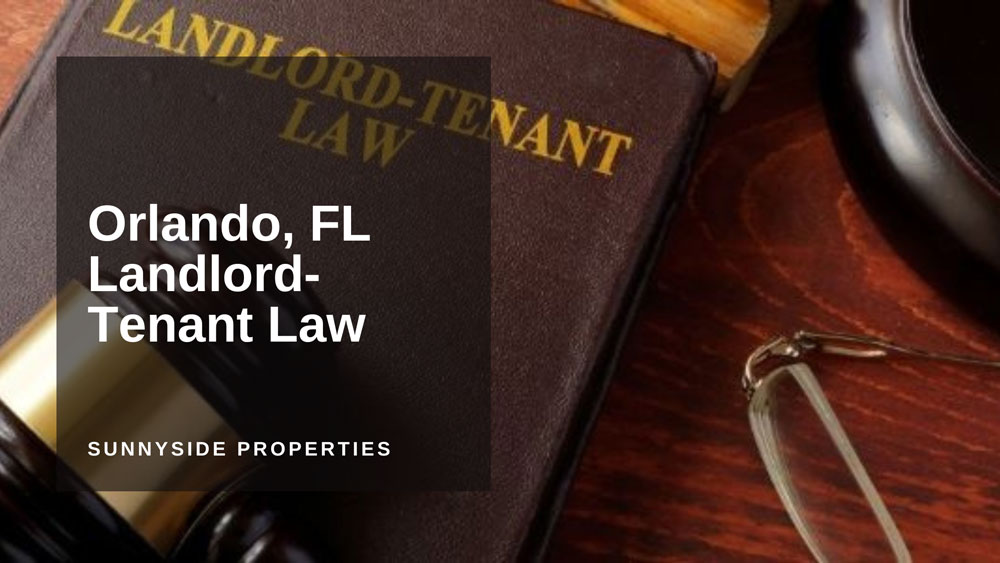At SunnySide Properties, we believe that a clear understanding of Florida's landlord-tenant laws is crucial for fostering successful rental experiences. These laws, primarily governed by the Florida Residential Landlord and Tenant Act, establish the rights and obligations of both landlords and tenants, ensuring fairness and transparency in rental agreements.
Landlords are responsible for maintaining habitable rental premises, promptly addressing necessary repairs, and complying with all legal standards.
Tenants, on the other hand, are required to pay rent on time, maintain cleanliness, and adhere to the terms of their lease agreements.
The Act also provides detailed guidelines for handling security deposits, lease agreement terminations, and eviction procedures, offering legal protections for both parties in case of disputes.
By staying informed about these regulations, landlords can effectively manage their properties while minimizing the risk of legal complications. Similarly, tenants who understand their rights and responsibilities are better equipped to navigate the rental process confidently.
Below, we’ve outlined essential aspects of Florida’s landlord-tenant laws to help you, as a landlord, ensure compliance and maintain positive relationships with your tenants.
Required Landlord Disclosures in Florida
In Florida, landlords must provide renters with these disclosures.

Federal law requires landlords renting out units built before 1978 to provide tenants with information about lead-based paint hazards.
Landlords must provide the resident with the names and addresses of the person tasked with the management of the unit.
Landlords with five or more dwelling units must disclose to the tenants how they’re storing the deposits and whether the account is interest-bearing.
Landlords must provide your renter with information regarding radon gas. That is, whether or not it is present in or near the unit.
Tenants’ Rights & Responsibilities in Florida
Tenants in Florida automatically obtain the following rights:
Live in privacy.
Be treated fairly as per the Florida fair housing laws.
Live in habitable premises.
A proper eviction procedure.
The return of the security deposit after moving out.
Proper notification before they terminate the rental agreement.
Proper notification before landlord entry.
Have repairs made within seven days of giving written notice to their landlord.
The aforementioned disclosures before the rental agreement becomes effective.
When it comes to the responsibilities throughout the tenancy, they include the following.
Paying rent on time whenever rent falls due.
Keeping the dwelling unit clean and sanitary as per the terms of the written rental agreement or lease.
Respecting the peace and quiet of other residents.
Using the provided fixtures and amenities for their intended purposes.
Not causing negligent or careless damage to the unit.
Abiding by all terms of the rental agreement, including observing the pet and guest policies.

Landlords’ Rights & Responsibilities in Florida
Renting out premises in Florida will automatically grant you the following rights. A right to:
Screen prospective tenants. The qualifying criteria must, however, observe fair housing laws.
Not renew a tenant’s lease without giving any reason after it expires.
Evict a renter for not observing the lease terms.
Require renters to pay a security deposit before moving in.
Terminate a periodic lease after proper notification.
Penalize a resident for breaking a fixed-term lease for a legally unjustifiable reason.
Raise rent.
Enter the unit for things like maintenance, inspections, and showings.
The list of responsibilities for Florida landlords throughout the tenancy includes the following.
Notify the tenant at least 24 hours before the intended entry.
Treat renters fairly as per the Florida fair housing laws.
Notify the renter before lease termination.
Return part or all of the deposit, less any allowable deductions.
Follow the proper eviction process when removing a renter from their rented premises.
Maintain the unit to the required habitable standards.
A Basic Overview of Landlord-Tenant Laws in Florida
Warranty of Habitability
Florida requires landlords to keep dwelling units safe, livable, and compliant with basic health and safety standards throughout the tenancy. This includes maintaining essential systems like plumbing, heating, and smoke detectors, addressing structural issues, and following local building codes.
If a landlord fails to make necessary repairs after being notified, tenants may withhold rent in future rent payment periods or, in severe cases, terminate the rental agreement, provided they follow legal procedures. This warranty ensures renters have a safe living environment while holding landlords accountable for essential upkeep.

Tenant Evictions in Florida
You must follow the proper judicial process when evicting a tenant in Florida. Among other things, this entails having a legitimate reason, serving the tenant with a proper written notice for eviction, and obtaining a court order.
Taking matters into your own hands, such as throwing out the tenants’ belongings, is illegal. You must also not try to evict the tenant as a form of retaliation or because of belonging to certain protected classes.
Security Deposit Rules
If you require security deposits in Florida, you must observe certain rules. Usually, these apply in the collection and holding of security deposits. The following are some of the things you must do in this regard.
Hold the tenant’s deposit properly. You’ll have three options to consider: normal account, interest-bearing account, or post a surety bond.
Only make appropriate deductions for things like unpaid rent, cleaning costs, or damage exceeding normal wear and tear.
Return the deposit after the tenant has moved out.
Explore Our Full Range of Solutions
Conclusion
There you have it. All the important basics that anyone renting out premises in Florida must know. If you have questions or need further guidance, look no further than SunnySide Properties.
With extensive experience in the Orlando rental market, you can rely on us for help on any aspect of rental management. Get in touch to learn more!
Disclaimer: Please note that the information provided in this blog is intended for general guidance and should not be considered as a replacement for professional legal advice. It is important to be aware that laws pertaining to rental properties may change, rendering this information outdated by the time you read it.


.png)